Healthy habits are not necessary only for overall health but also for dental health. If the teeth are not healthy, the child has cavities or has a toothache, the child will not be able to eat properly. When the child does not eat properly, the child will lose weight, will be lethargic and feel sick and tired most of the time.
Not only this, the child who has carious teeth, teeth that have black spots are more likely to lose their self-confidence. They are bullied more at school. So, following healthy habits are very important for overall health as well as beautiful teeth and a smile.
If you are looking for healthy habits for your child to get healthy teeth, you have landed at the right place. Let us look into what healthy habits you can teach your child for beautiful teeth and smile.
1. Brushing Twice Daily
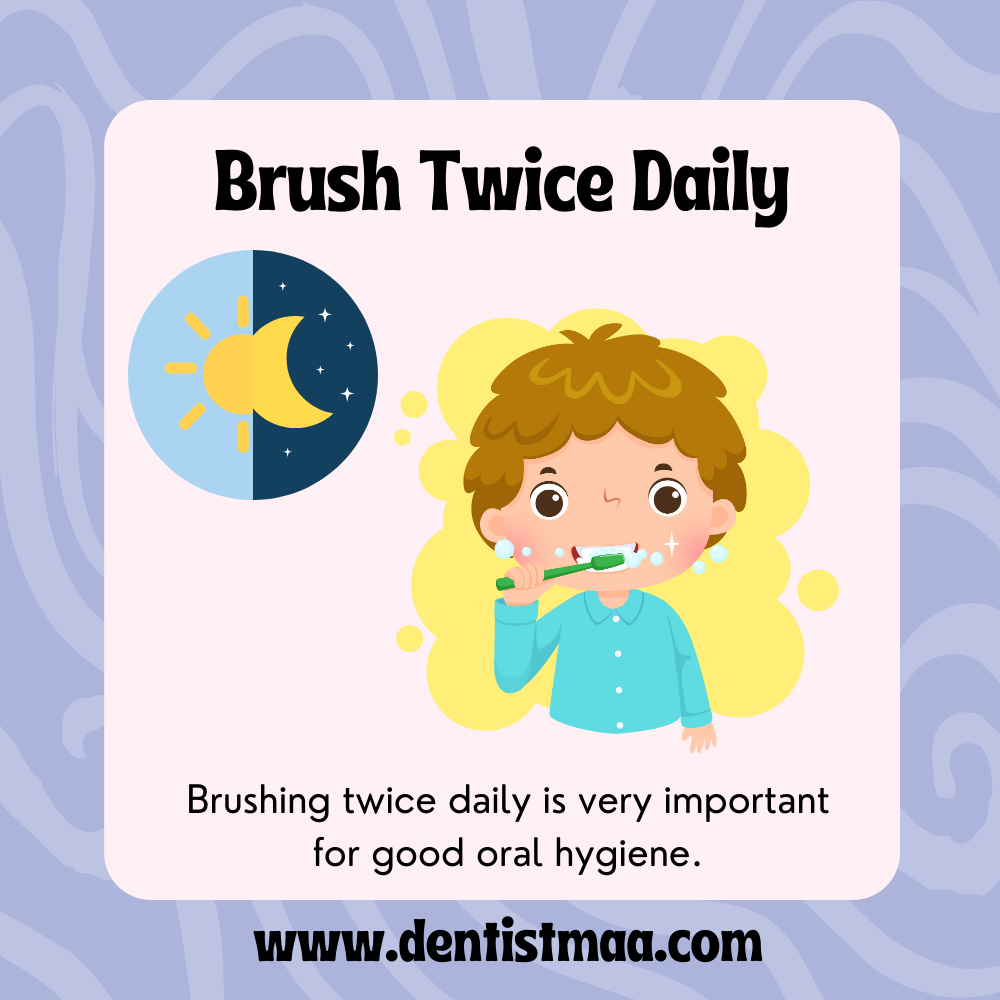
Make your child brush their teeth twice daily, once in the morning and once in the night before bed. Starting these healthy habits early is very important as the child will not find it difficult later. It will be a normal routine for the child.
Use an age-appropriate fluoridated toothpaste for your child since the first tooth erupts in the child’s mouth. Remember to use only a grain size of toothpaste till the age of 3 years and a pea size after the age of 3 years. Do not use adult toothpaste for your child.
Brush your child’s teeth at least till the age of 5-6 years as the child might not have the dexterity to brush on her own. After the age of 6 years, supervise the child while brushing.
Related: 10 exciting ways to get your child to brush their teeth
2. Avoid Too Much Sticky Food
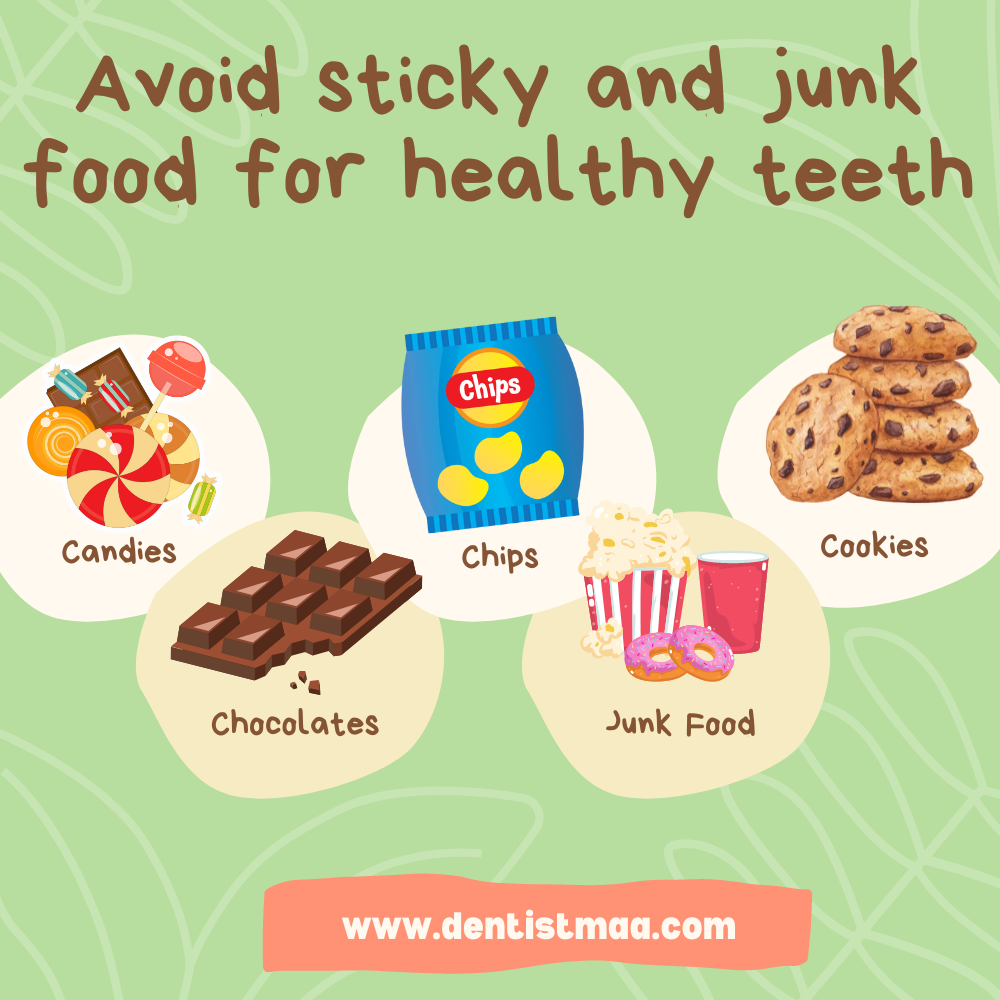
Sticky food is the main reason for cavities and eating too much sticky food is not a healthy habit. Anything that sticks to the tooth for a long time will be responsible for causing cavities. Kids who eat too many chocolates, chips and cookies are more prone to get cavities. Children who watch TV along with eating their meals are in a habit of keeping food in their mouth for a long time. This is another reason for cavities in children, as the food is sticking to the surface of the teeth for a long time.
Avoid introducing sticky food to children as these are not healthy habits. Avoid television while eating. If the child is eating chocolate or biscuits, give it only once a day and make the child either drink water after it or brush the child’s teeth.
Lollypops or stick pops are another major cause of cavities in children and should not be introduced.
3. Take a Healthy Diet
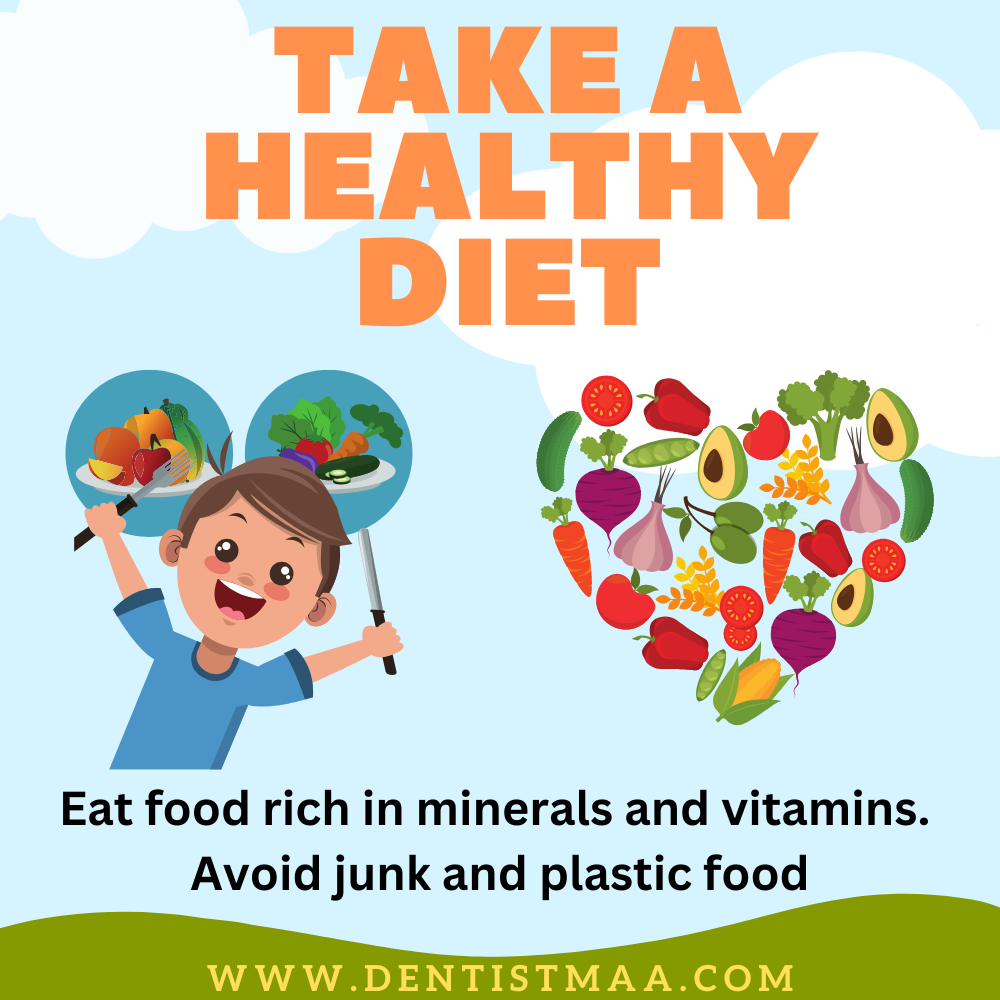
Vegetables and fruits are the most essential part of the diet, along with pulses, grains and nuts. Avoid packed and processed food for your child and also for yourself. Give raw vegetables like carrots, cucumbers, radishes, tomatoes etc. to your child. It keeps good overall as well as good oral health. Avoid high calory and sweet food. Eating a healthy diet daily is a healthy habit for both kids as well as parents.
4. Visit a Dentist Once Every 6 Months
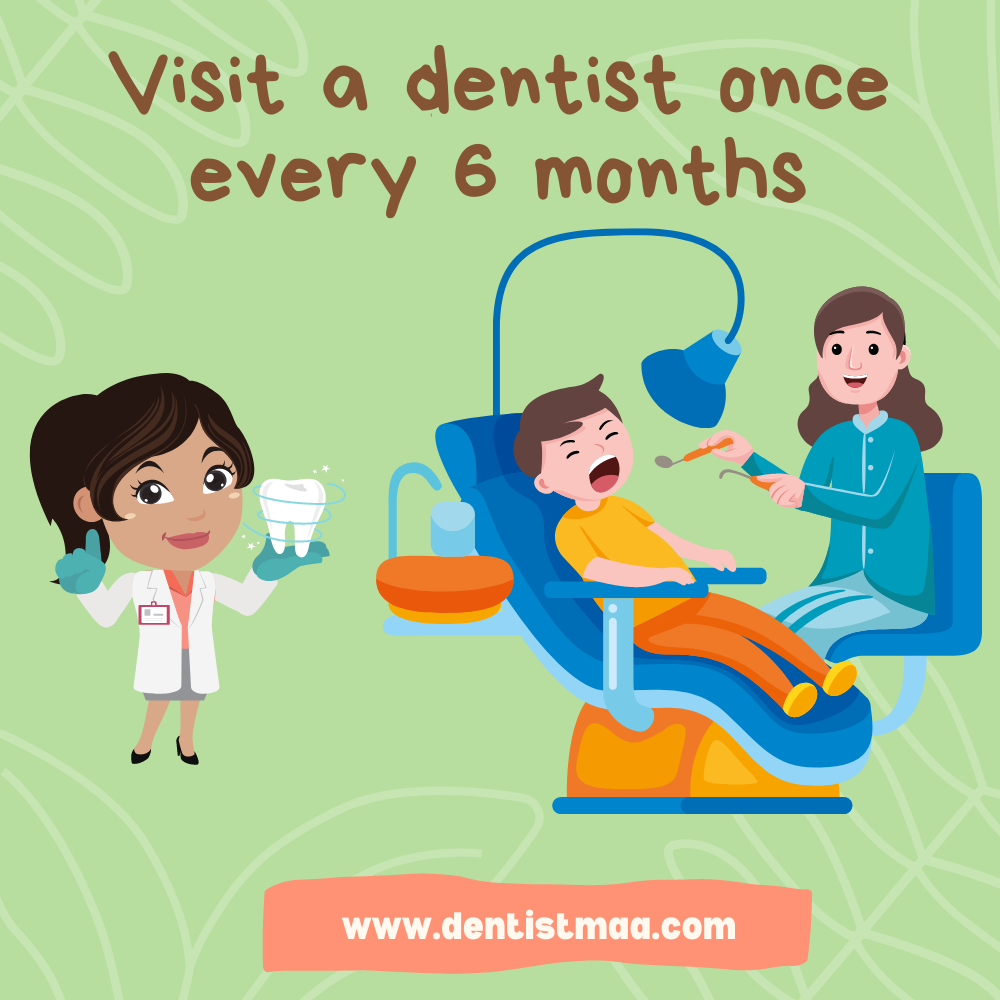
Visiting a dentist once every 6 months is a habit you should instil in your child. The child will get use to the dental office, will be more comfortable as it will be a routine, and will not resist or hesitate. This will help in keeping better oral hygiene and detecting the cavities if any, early. Also, the dentist will teach how to brush properly, which toothpaste to use, what diet to avoid, etc.
It will add to your child’s beautiful teeth and smile, helping the child be more confident and healthy. The child will follow the same when she grows up out of habit.
5. Avoid Artificial Juices
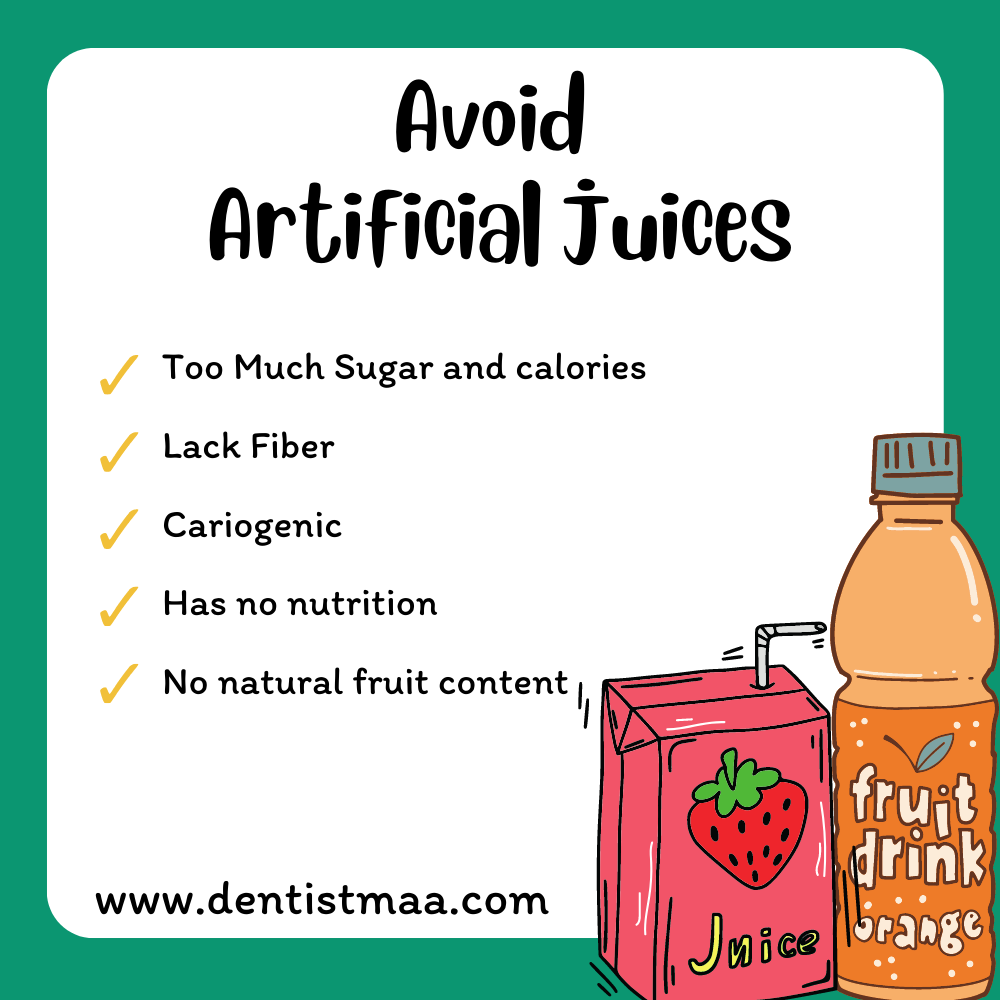
Artificial juices are full of sugar. Sugar in any form is harmful to the child’s teeth and should be strictly avoided. Many parents are in the habit of giving their children pacifiers or bottles full of artificial juices or even milk and sending them to sleep. It is not a good habit and can cause cavities in the child’s teeth (nursing bottle caries). The child’s bottle should be filled only with water and nothing else.
6. Avoid Anything Sweet in Sippy Cups and Bottles
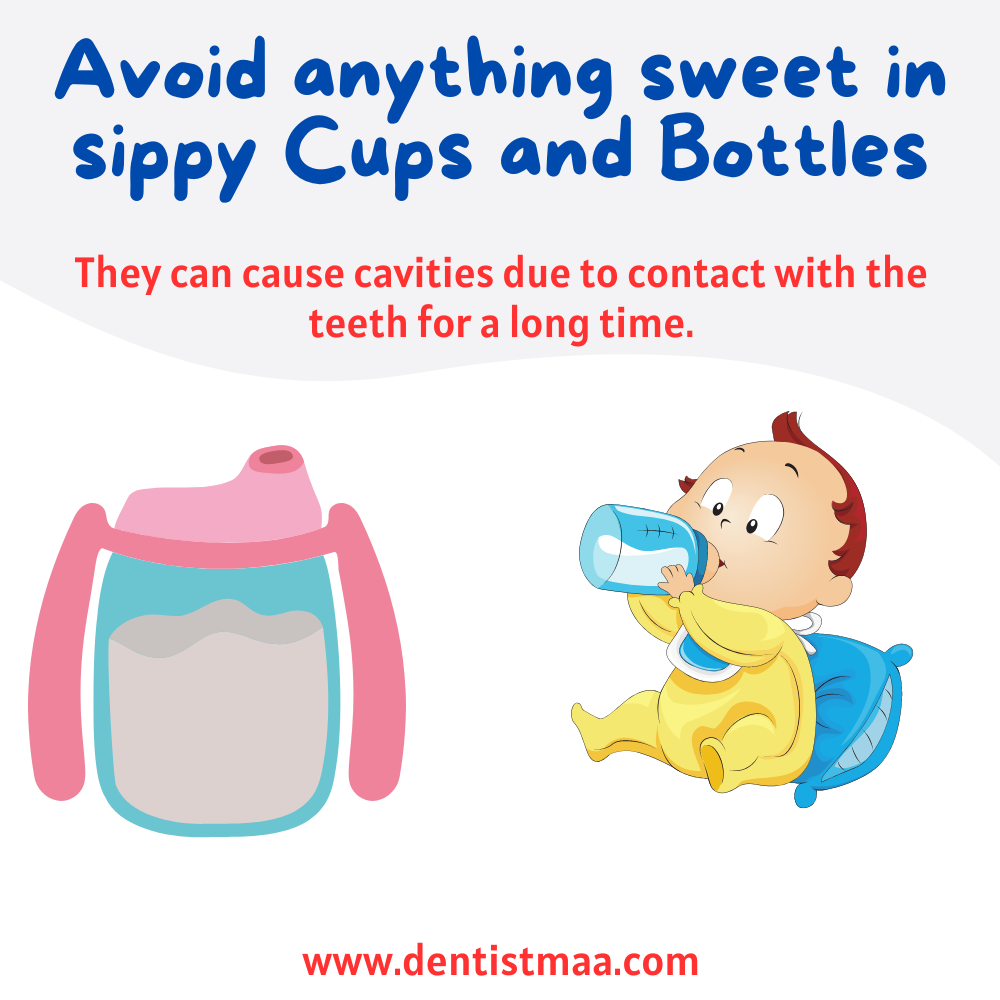
As mentioned above, the child’s sippy cups and bottles should have nothing sweet in them especially when the child is going to sleep with the bottle in the mouth. Make sure the child drinks water (kids who are 6 months plus) before going to sleep if they had anything sweet. Giving the child a bottle or a sippy cup to drink milk just before bed time is not a healthy habit.
7. Floss Daily
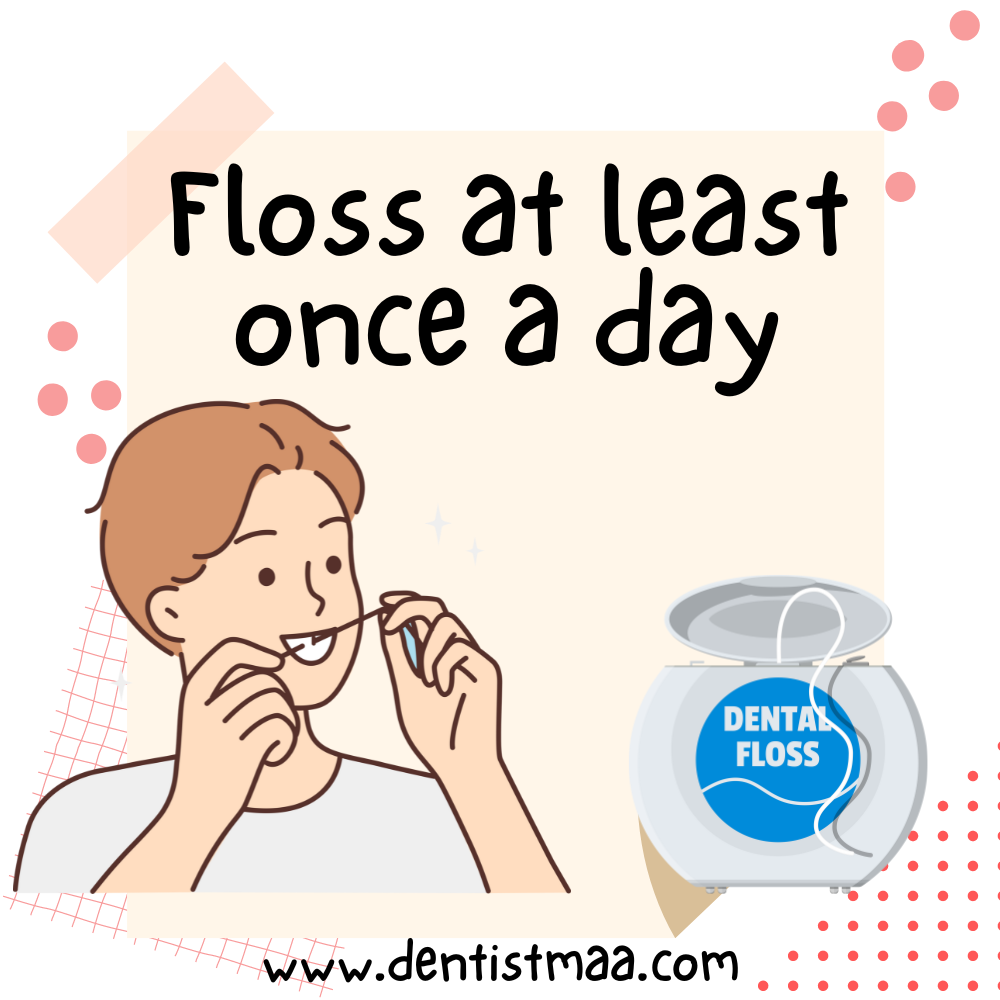
If there is a gap between your child’s teeth, flossing might not be required. This is mainly seen in the milk teeth. But as the child grows and the permanent teeth erupt, the spaces between the teeth start closing. At this time the child needs to start flossing. Flossing prevents cavities in between the two teeth that the brush can not reach.
Children younger than 6 years who do not have gaps in between their milk teeth should also floss. As the child might not be able to floss his or her teeth on their own, a parent should help them floss their teeth once every day. Flossing is a healthy habit and prevents cavities.
8. Change ToothBrush
Changing your toothbrush when required is very important in maintaining proper oral hygiene. When should you change the toothbrush is another important question. You can click on the following link and watch the video for the details of when should you change your toothbrush.
So, when should you change your brush:
- After every 3 months
- When the toothbrush has frayed
- After you recover from a flue
Related: Toothbrush Care Manual
9. Reduce Soda Intake
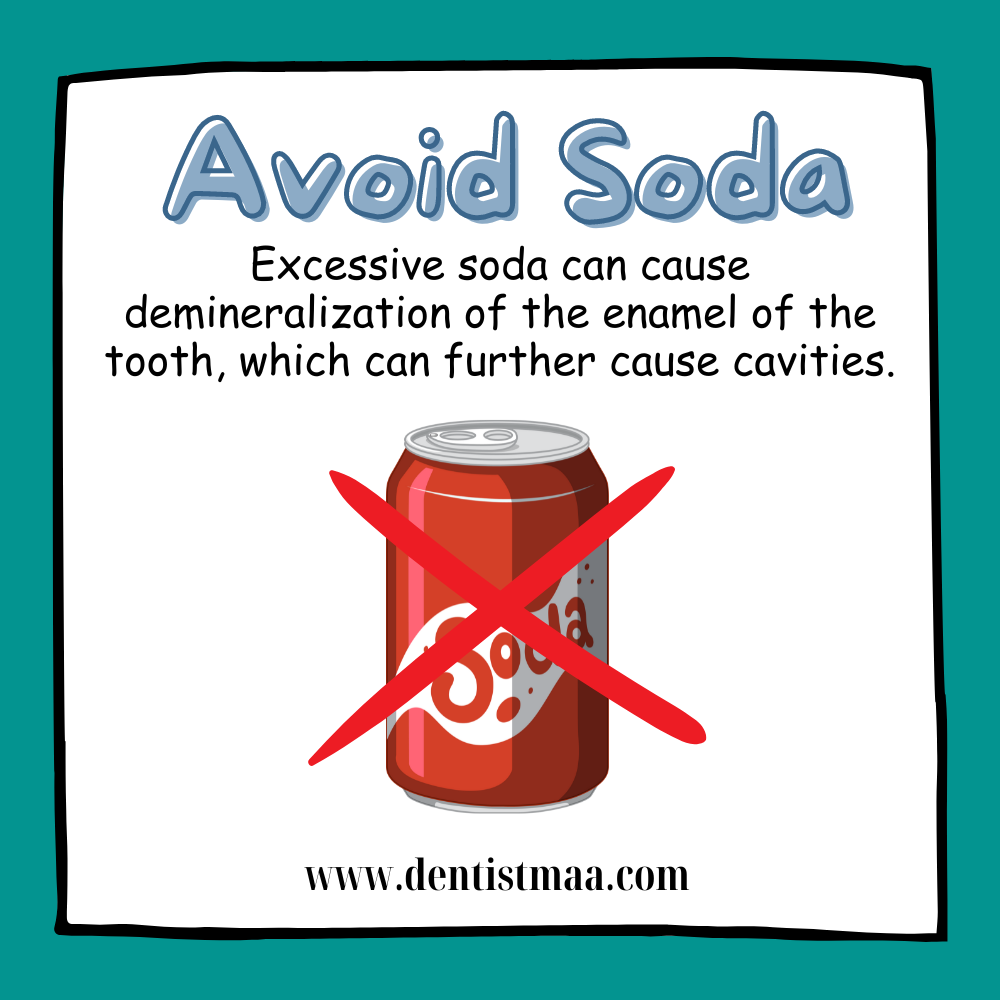
Soda is one of the major reasons for cavities and erosion of the teeth. Also, soda is not good for the child’s overall health as well. The sugar along with the acids which are present in soda or aerated drinks cause erosion of the enamel. This further leads to cavities. So, giving soda frequently to your child or drinking it yourself is not a good idea. It is not a healthy habit to drink soda every day.
10. Use Only Sugarfree Gums
Some kids especially teenagers are fond of chewing gum. It is preferred to chew on sugar-free gums which are widely available in the market. As the gum is there in the mouth for a long time, the teeth are exposed to sugar for a long time. This can cause cavities and should be avoided.
Looking for a dental visit for your child?
You can book an appointment with us and get an expert opinion.
www.32sparklets.com
WhatsApp or Call on +91- 9501015088 or +91- 9646805088
What should I avoid for my kid to maintain good oral health?
You should avoid sticky food like chocolates, chips, candies, lollipops, and cookies.
Avoid filling your child’s bottle or sippy cup with sweet fluids.
Avoid giving milk to your child just before bedtime.
Avoid missing your child’s regular routine dental appointments which are very important.
How do you develop healthy oral habits in your children?
First, you should have healthy oral habits.
Make your child brush twice daily using a kid’s age-appropriate fluoridated toothpaste.
Avoid sticky and junk food.
Eat more fresh fruits and vegetables.
Avoid introducing candies and chocolates to your child.
Visit your dentist regularly and take your child along. The child’s first dental visit is mandatory by the age of 1 year.
How do you teach your children healthy eating?
You need to eat healthy yourself first.
From the time your child is a toddler introduce only healthy food to your child.
Do not get junk food like chips, biscuits, soda etc. at home.
Make a habit to give your child only fresh fruits and vegetables during the snacking time.
Explain to the child from an early age the difference between healthy and unhealthy food.
What is the best time to brush our teeth?
Brushing twice a day, once in the morning and once in the night before going to bed is mandatory. This helps in maintaining good oral hygiene. You a grain size of kid’s age-appropriate fluoridated toothpaste for children below the age of 3 years and a pea size after the age of 3 years.
Is brushing teeth important for kids?
Yes! It is a myth that when just 1 or 2 teeth have erupted there is no need to brush. But that is not true. You need to brush every single tooth in your child’s mouth twice daily. The milk teeth are as important as the permanent teeth. They serve the purpose of maintaining space for the permanent teeth, helping the child to chew and have confidence.
How can I make brushing my toddler’s teeth fun?
Brushing can be fun when you make brushing a game. Start brushing your child’s teeth as soon as the first tooth erupts. This helps in developing a habit and the child thinks it is a routine thing to do and nothing extra. Brush along with the child. Click on the link for some exciting ways to help your child brush his or her teeth.
When should you start brushing your child’s teeth?
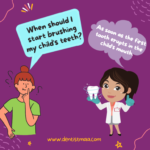
Brushing a child’s teeth should start as soon as the first tooth erupts in the child’s mouth. Start brushing using a grain size of kid’s age-appropriate toothpaste when the child is above the age of 6 years. Use a pea size of toothpaste after the age of 3 years. Never use adult toothpaste for the child.
Can brushing too much be bad for kids’ teeth?
Brushing twice a day is enough for the child as well as for the adults. Too much brushing can lead to erosion of the enamel surface and can also injure the gingiva. Also, never brush too hard.
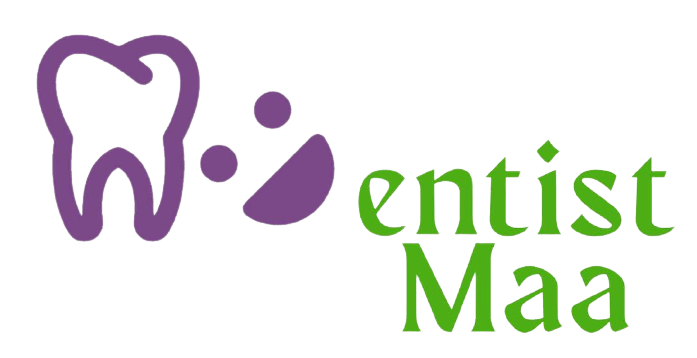
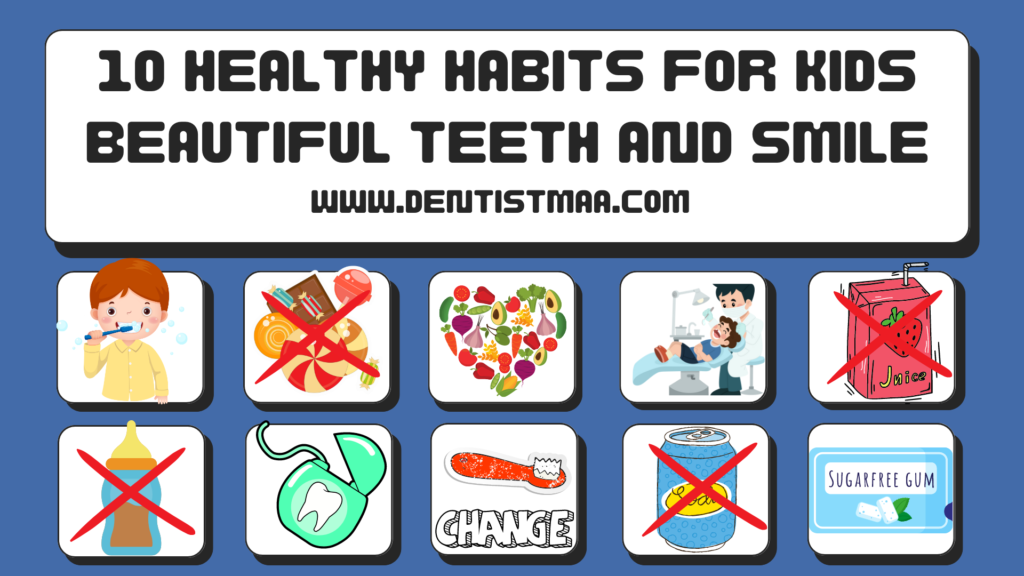
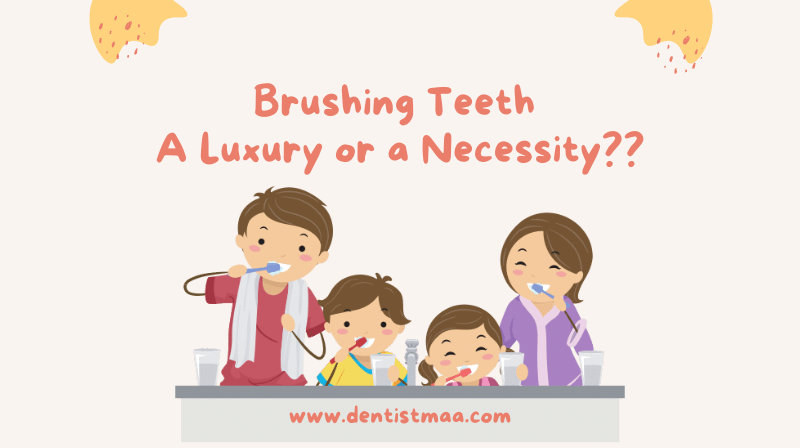
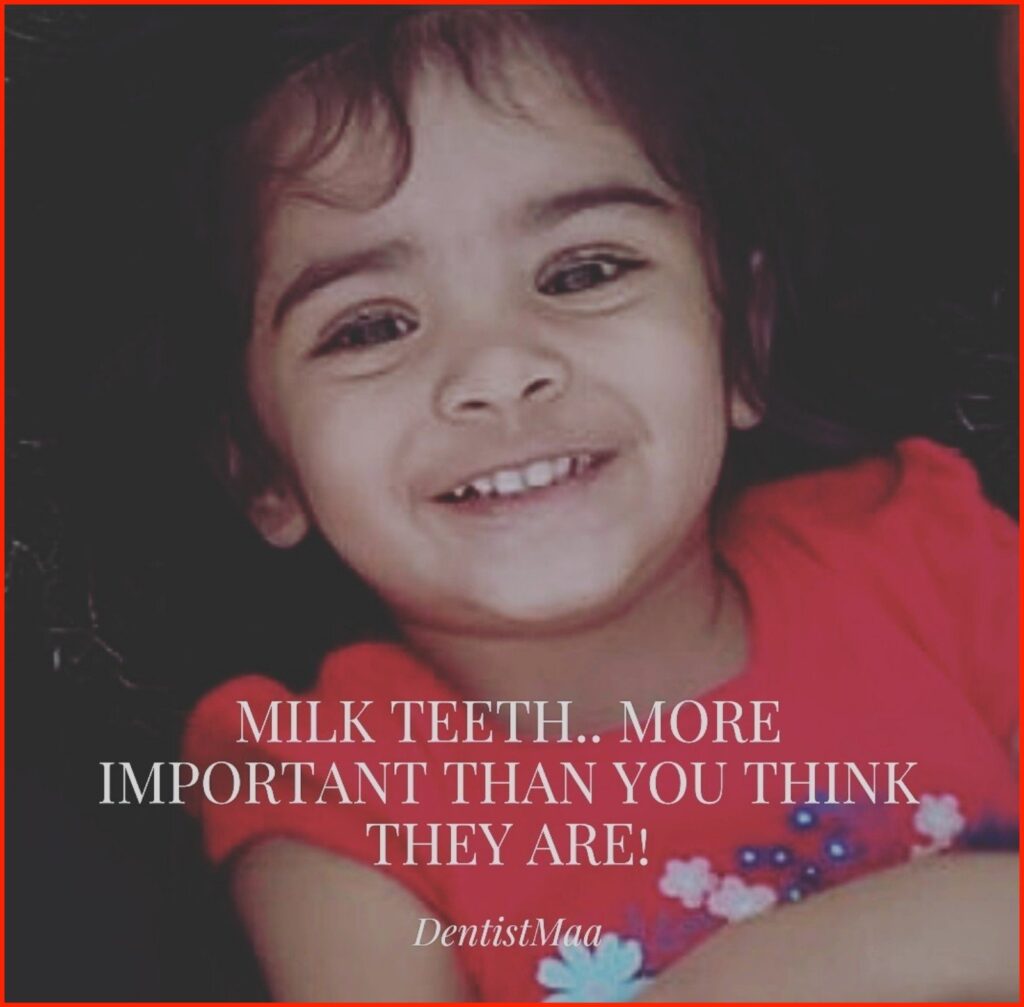
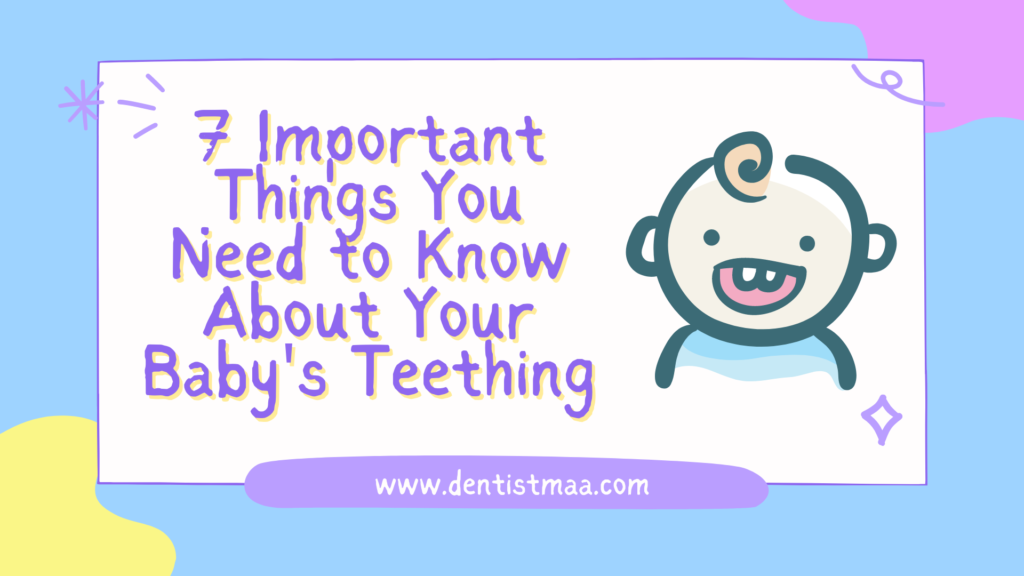
Pingback: 10 Tips to Prevent Cavities in Kids: A Parent’s Guide - Jaya Sinha